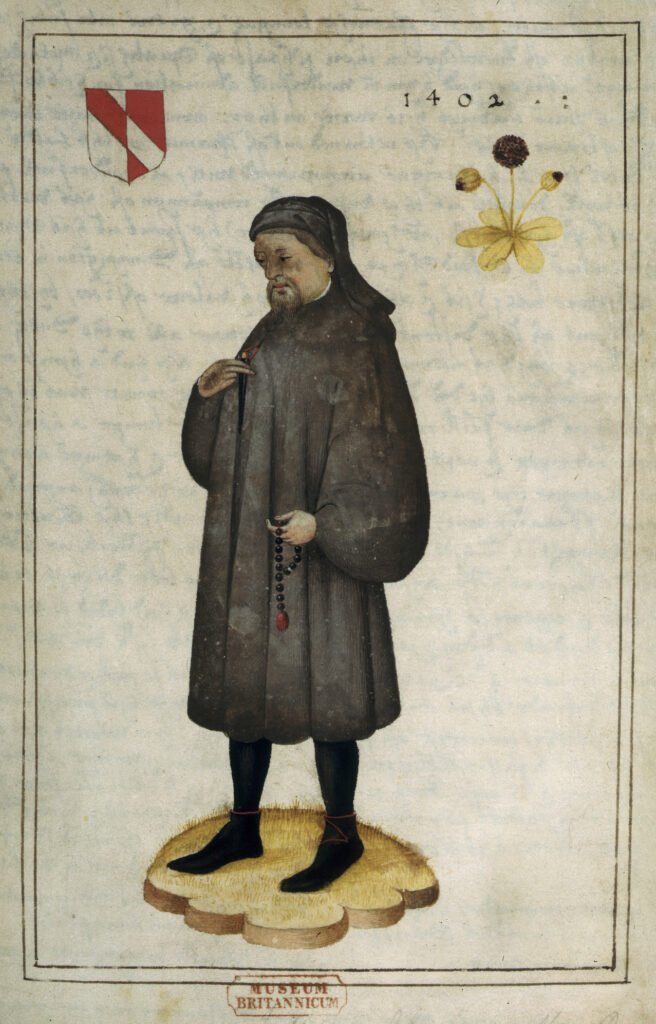Geoffrey Chaucer: The Celebrated Father of English Poetry
Introduction:
Geoffrey Chaucer is celebrated as the “Father of English poetry” for his significant contributions to popularising and elevating the status of English poetry during a time when Latin or French dominated literary circles. His innovative storytelling techniques, relatable language, and vivid portrayal of characters from all walks of life continue to captivate readers even today.

Geoffrey Chaucer’s Early Life and Background:
Geoffrey Chaucer was born in London, England, around 1343, into a family with connections to the rising merchant class. Little is known about his early years, but it is widely believed that he received a good education, which was a privilege reserved for the aristocracy and the affluent. This education would prove instrumental in his literary endeavors.
Chaucer lived in England approximately 600 years ago, a period when Latin and French were predominantly used for writing and communication. Despite this, he recognized the potential of the English language for poetry and set out to demonstrate its capabilities through his literary works.
The Canterbury Tales:
Geoffrey Chaucer’s most renowned work, The Canterbury Tales, stands as a testament to his prowess as a storyteller. Written in Middle English, this collection of stories, originally published between 1387 and 1400, is a masterpiece of storytelling. It consists of 24 tales told by a group of pilgrims on their way to the shrine of Thomas Becket in Canterbury, with each tale reflecting the diverse perspectives and experiences of its characters. Chaucer’s unique narrative technique, which includes describing the pilgrims themselves as they tell their stories, adds depth and complexity to the overall work.
The tales encompass a wide range of genres, from romance and comedy to social satire and morality tales. Through these tales, Chaucer masterfully paints a vivid picture of medieval English society, with all its quirks, vices, and virtues. His characters, such as the Wife of Bath, the Knight, and the Pardoner, are timeless and relatable, providing a mirror to human nature and behavior that is as relevant today as it was in Chaucer’s time.
The Canterbury Tales is celebrated for its skillful use of irony, humor, and social commentary. Chaucer’s ability to capture the essence of his characters and their individual voices makes his work a timeless reflection of human nature and societal dynamics.
Accessible Language and Realistic Characters:
One of Chaucer’s key strengths lies in his ability to write in a language that ordinary people could understand. He eschewed complex language in favor of everyday English words, making his poetry relatable and engaging to a wide audience. Moreover, Chaucer’s skillful portrayal of characters from various social classes, such as knights, monks, and merchants, breathed life into his stories and provided insights into medieval society.
Insights into Medieval England:
Through his writings, Chaucer offered readers a glimpse into the social, cultural, and moral landscape of medieval England. His tales explored timeless themes such as love, friendship, greed, and honesty, resonating with audiences across generations. Additionally, Chaucer’s firsthand experiences as a government worker and traveler enriched his storytelling, lending authenticity to his narratives.
Geoffrey Chaucer’s Legacy and Continued Relevance:
Despite the passage of centuries, Chaucer’s work remains relevant and influential in the realm of English literature. His exploration of universal themes and his masterful storytelling continue to inspire readers and scholars alike. Chaucer’s enduring legacy as the “Father of English poetry” is a testament to his lasting impact on the literary world.
Conclusion:
In conclusion, Geoffrey Chaucer’s contributions to English poetry are unparalleled. His groundbreaking work, “The Canterbury Tales,” exemplifies his skill as a storyteller and his ability to capture the essence of medieval England. Through accessible language, realistic characters, and timeless themes, Chaucer’s writings continue to captivate audiences and secure his place as a literary giant in English literature.
